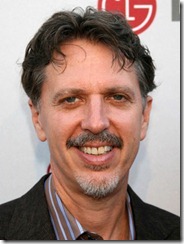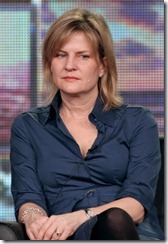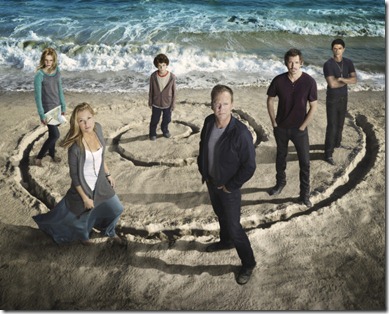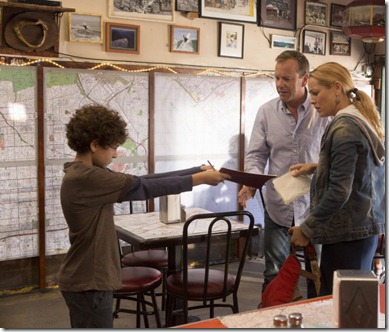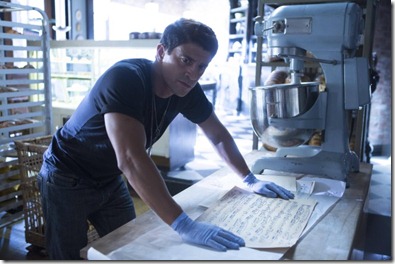When Fox’s Touch (Fridays, 8/7C) returns tomorrow, there will be new locations and situations – and new series regulars. Wednesday afternoon, series creator/co-showrunner Tim Kring and co-showrunner Carol Barbee (herself a newcomer to the show) spoke with a group of journalists/bloggers about the changes and what fans can look forward to in season two.
Sadly, no one thought to ask if we’d see any more of the two Japanese pop star-wannabes, but lots of other cool stuff came up in the conversation.
In the second season we have a new setting, a lot of new characters, and a new story. Could you talk a bit about this sort of reinventing of the series for the second season?
Tim Kring: Yes. We start the season off very much where we left off the season at the end of Season 1 so that if you watched the season finale we will pick directly up from that and continue the story that we were telling at the end of the season. Again, if you were a loyal viewer of the show you will have noticed that the show started off in a kind of standalone nature where every episode had a beginning and middle and an end and things were sort of tied up.
By the end of the season we had introduced a more serialized engine to the show, and we ended the season with Kiefer Sutherland’s character taking his son and running, basically on the run, and coming all the way to California in search of this mysterious girl named Amelia. We sort of introduced the idea of this mystery girl early in the season, in Season 1, and by the end of the season we are in Los Angeles on the journey to finding her, and that connects us up with Maria Bello’s character who is Amelia’s mother. That’s where we pick up the season.
In many ways everything changes from the first season to the second season in that we took the entire storyline and took it from New York City to Los Angeles, and that entire world and all the characters that were in that world are starting pretty much fresh in the second season.
So is the show going to remain heavily serialized that we get in these first two episodes or are you also going to be bringing back some of like the feel-good reunion love connection type of intertwined story that you used to have in the first season?
Carole Barbee: Hi. It’s a combination of both. I’d say this year the stories—there are three main stories that are all serialized in their own way, and they’re all barreling towards one another so that there comes a point where they all intersect, and that’s where the major thrust of the action is. We have a character who is one of the special people like Jake but he’s bent on tracking them down and doing harm to them so we’re watching that happen and seeing who he is able to get to and who he’s not, and obviously he’s coming for Jake. And then we have the character—
Tim: That character is played by Said and I don’t really know how to pronounce that.
Carole: Taghmaoui. We’re having a very hard time with that.
Tim: T-a-g-h-m-a-o-u-i.
Carol: He’s fantastic. He gives such a drive to this season. We have another character who is played by Lukas Haas, a name that’s easy for me to say, and he plays Calvin Norburg who is a genius who has been doing the work and trying on an analog level to achieve the kinds of results with numbers and patterns that Jake is able to do naturally. We have him also on Jake’s trail.
Anyway, these three stories sort of barrel towards one another. There are still those connections that happen around the world. Some of them are much darker this year because of the story with Said, but it’s much more of a page-turner. It is serialized. Every episode does feed in to the next.
Tim: I think what happened at the end of last season or towards the end of last season, by introducing this nefarious villain in this corporation Aster Corp that we introduced, and by raising the threat to Jake and to people like Jake it really dictated that was the direction we were going to go in in the second season. Once the mistakes had been raised it was very hard to sort of back off of that, and it dictated a much more serialized storytelling that we’re doing in this season.
So these changes that you guys just both described personally I thought it was taking the show in a really good direction, and I really enjoyed the finale and sort of the lead up to that moment. But I’m wondering was that change sort of planned or was it sort of in reaction to something?
Tim: Well, again, if you paid attention to the show last year we did start as a sort of standalone show because, frankly, we wanted to make sure that we got viewers when new viewers were sampling it at the beginning of the season. We wanted to make sure that people weren’t thrown off of the show because they didn’t know what was going on. But we started introducing the idea of a serialization really early on. In the very first episode after the pilot we introduced that there was a mysterious person in this room in the board-and-care facility, and we slowly started to leak out who that was, and by Episode 6 when Danny Glover’s character was killed we knew that he died in a way that was mysterious and it was attached to this corporation Aster Corp that he seemed very afraid of.
I think it was a very subtle burn, a kind of slow fuse that built to the last three or so episodes, and by that time the show had morphed in to much more of a serialized show, and then picking up where that left off we kind of picked that up in a full blown way. It was designed but a bit subtle for the audience I think.
All right. And I want to ask you too about Kiefer because I really enjoy him in this series. I think he’s the kind of actor that I would watch on anything, but coming off of 24 do you guys feel any sort of added pressure to sort of put him in more action packed type situations?
Tim: Well, I don’t know that it’s pressure. I think it’s an advantage to have somebody who has that in his wheelhouse and this character was always designed to be an every man who was put in extraordinary circumstances and forced to become much more of an action kind a guy than Jack Bauer ever was. In other words, Jack Bauer his backstory was much less of an ordinary guy; he was sort of built to be that guy. This guy was not built to be that guy. He was a reporter and a family man but he’s thrown in to these extraordinary circumstances, and I think it’s really just using some of the skill sets that come along with somebody like Kiefer.
All right. Thanks, Tim; appreciate it.
I would like to ask you about the production design, about the difference between this season and the first one. Thank you.
Carol: Production design, so the—
Tim: Well, you know the show is going to look a little different just because we are shooting it for Los Angeles. In the first season we actually shot everything in Los Angeles no matter where we were, if we were in Africa or Japan or wherever. We were actually within 30 miles of our offices here, and that became something that was actually very difficult to do because we’re in sunny Southern California but we could never say that we were in sunny California. By moving the storyline to Los Angeles it made it much easier for us, production wise, to actually point the camera in any direction and say that we were here as opposed to some other part of the world.
But the production design on this how has always been very challenging in a really good way because we depict so many different places, and we work with this incredibly talented team. One of the things that we try to do is move as quickly as possible so we designed the shooting style that allowed us to use a lot of natural light and a lot of natural locations. In other words, if we have a scene that’s set in a bicycle store then we go to a bicycle store and we shoot there rather than making one ourselves and having to pay for all that. That’s sort of the style that we adopted and we took that to kind of new levels this year by really designing a shooting style that allowed us to move very quickly.
From the get-go Tim and Carol you’ve explained that the whole center of the show is how people connect with each other. How people touch and inspire each other; that was show in all the … as well as the main stories. Why do you think that people think that’s going to get lost in the second season, that that’s all going to be downplayed and the whole focus of the show is going to get lost?
Carol: I would say that while the season starts off with Martin on a mission and there’s danger involved last year it wasn’t dangerous. He was being sent on these missions by his son that helped people find each other and helped things happen, but it wasn’t necessarily dangerous. By the end of the last season it was dangerous and he had to go on the run. We got that ball rolling downhill. He’s on the run and it’s dangerous; people are after them, but then those connections do start to happen again so that part of the series does not get lost. It definitely comes back in to it, and also within those stories that are barreling towards each other even with the danger there will be those touches that happen around the world. I think that the audience will be satisfied because they’ll actually have both.
(extended silence)
Carol, are you there?
Carol: Yes.
Okay. Say what you said again. I think everyone lost the connection.
Tim: Where’d you lose it?
Carol: Yeah. Did I say anything? Did you hear anything?
No not for like five or six seconds. Not as bad as CBS with the Super Bowl Sunday…
Carol: What was I saying?
Tim: Simon, can you go ahead and say what the last thing you heard was just so Carol can pick up—?
You were saying that the connections that ended the story, the … for example, where you had different people from around the world, how they were connecting to each other and how it all came back to the main story; how that is not going to get lost despite the fact that you’re taking the show in this direction of the main story.
Tim: Well, listen, the truth is there will be less of that idea of sort of disconnected people who somehow connect up at the very end of the episode. Because of the nature of the very high stakes that are driving the main story it’s sometimes very hard to jump off of that train and on to a story that doesn’t have a lot of stakes to it. I think once we start down this hill I think people are going to be pretty hooked on the idea of finding Amelia and what it all means and who is behind all of this. My feeling has always been that we can always—while there are still parts of that in this season we can always come back to that, and I think once the danger is lifted then we see sort of glimpses of how we’re going to come back to those kinds of stories.
My first question is you were speaking earlier about some of the challenges of filming in Los Angeles during the first season. What were some of the challenges for the making of this season?
Tim: Well, you know the show is—because we cram a lot of story in to one episode it’s always challenging to make a show. Every show has its own challenges, but I have to admit this year was much less challenging by being here. One of the challenges that you have is the kids in the show, both David and Saxon (who plays Amelia) are both under 16 years old, and so because of that we’re limited by how much time we can actually film with them, and they have to be in school for a certain number of hours during the filming. Whenever you have children playing a major role you always have the challenge of dealing with that.
But we try to put as much production value on the screen as possible so there are always location issues. Los Angeles is sometimes difficult location wise because people have gotten used to the fees that are paid to park trucks and all of that kind of stuff. That’s why you see a lot of production leaving Los Angeles because it’s expensive to film here. We have the same challenges that everybody else does.
And how do you think fans will react to the new more serious storyline this year?
Carol: I think the audience is going to be thrilled. I think it’s a real page turner. It’s sort of a thrill ride this year, and you’re watching Kiefer Sutherland, who people love to watch on a mission. You’re watching him on a mission and he’s got a great storyline. I think people are going to really hook in and really enjoy it and take the ride.
Tim: I can’t really stress enough that the loyal viewer of last season I think will find this very seamless because there has just been such a natural progression on this story, and especially towards the end of last season. All of those things were rewarded; you were rewarded for your loyal viewing. All those sort of hidden Easter eggs start to show up about Aster Corp and about the 36 chosen ones and all of that mythology gets flushed out in a really big way in the second season. You’re very much rewarded for having been there from the very beginning.
I was wondering how big of a difference and how true to life … that all of a sudden Jake can now speak? How is that going to play out and does that raise Martin’s expectations that his son is finally coming back to him or is on the road to come back to him, so to speak?
Tim: Well, we’re reserving—early on we’re preserving the idea that he doesn’t speak. Nobody sees that in the first part of this season, and so when that happens and if it happens we’re still not talking about right now. But there certainly is a new kind of form of communication, and I think the last minute of the season finale of last season really points to so much. Not only are you introduced to this brand new very big character (Maria Bello’s character) but Jake actually takes his father’s hand for the first time and touches him so the idea of touch actually becomes this very big move forward in their relationship.
In the second season we’re going to play with that idea of their ability to communicate with each other a lot, and so I think people who felt maybe frustrated that there was little communication are going to feel a lot less frustrated by the ways in which Jake communicates to his father without speaking are going to really increase this season.
Carol: I think we’re also playing with an evolution in Jake and in people like Jake so it’s also rooted in the mythology of the show as to what is happening and how quickly it’s happening or how slowly it’s happening. But they’re sort of raising something in each other and we’ll see that develop as we go along.
If I can just ask one more thing; did you feel like that was necessary not so much to move the story along so that we could do this for seven years but that people wanted a payoff? They wanted Martin to get something that he’s worked so hard out of this relationship with his son?
Tim: Well, you know the truth is when we talk about the audience like people want that we very much internally are sort of like the audience. I mean the writer’s room and all of us who are making the show often have the same kind of arch with the show that the audience does. Just when we start to feel like we’ve gone too far in this direction or too little in that direction I think it mirrors where the audience is.
Listen, 13 hours of story is a lot of story, and when we all grow up watching movies 13 hours is a long time and so you do have to move things forward or else it starts to feel like there’s sort of a stall going on. I think people want things to move forward but they don’t want things to change too much at the same time so there’s always a balance with that. We’ve found a very subtle way for them to start communicating with one another in kind of new ways, and it really liberated us, and I think it actually liberated the actors a little bit in playing those parts.
Obviously there’s the underlying kind of sci-fi feel just in terms of the … of exactly what is going on with the connections and such. Have you guys decided to kind of downplay that aspect of it so it’s much more grounded this season or will there still be kind of elements that will make people that are maybe looking to the more sci-fi be able to still question whether or not these powers and these connections are something that might be unexplainable in that way?
Tim: I think that part of it actually sort of gets heightened a little bit this year, and I don’t know that I would call it sci-fi as much as kind of mystical or—yeah sort of it may be supernatural more than sci-fi yes, but I think it gets heightened a little bit this year when we dig in to the mythology of who Jake is. Why he is the way he is and why are there others out there? It’s not much of a spoiler to say that we do introduce this idea of this new character Amelia, played by Saxon…
Carol: Sharbino.
Tim: Yeah. She comes in to the show fairly early on in the season and is someone who possesses the same sort of abilities that Jake has, and so we dig a little deeper in to it this year, and we don’t shy away from it.
Carol: And then the mythology of the numbers and what they all mean Jake has started those numbers from the first episode from the pilot and they continue. You will understand this season what they mean and what their power is so I think that also feeds in to the supernatural sci-fi element.
I was wondering if you could talk a bit about this … mix that Maria Bello brings to the show and how that affects the relationship between Martin and Jake, how those three kind of come together.
Carol: We had a lot of fun with the Lucy character, which was Maria Bello’s character, because she is a mother bear on a mission to find her daughter. That’s all she cares about, and she gets involved with Martin and Jake because they are also looking for her daughter, but along the way where they agendas collide she’s going to do her thing. All she cares about is finding her daughter so she and Martin come in to a lot of conflict along the way.
What I love and I think what the writers—what we all really enjoyed writing was her relationship with Jake because Jake hasn’t had a mother his entire life. His mother died when he was 9-months-old so he now has this sort of de facto mom in the house, and she’s not your regular mom. She’s got a great way with him. She’s not precious with him and yet she’s very loving and accepting of him, and he really bonds to her.
It brings a great element in there and it gives Martin somebody to talk to and to share things with. She’s somebody who is three years ahead of Martin on the trail of Aster Corp and these numbers and everything else so she knows things that Martin doesn’t know. It’s a great relationship with him but it’s fun to see them build this little family together.
Tim: And as we say they’re sort of part of the smallest private club in the world because they share this unique—these children with unique abilities. But yeah this idea that both of them have their own agendas for finding Amelia and that’s going to come in to conflict in the sort of Sophie’s choice of it all of what do you do when your own child’s wellbeing is at stake. Which side do you choose? That’s where we’re moving with that storyline.
Since Martin and Jake are on the run this season how important was it to tap in to some of the intensities that Kiefer was known for on 24? Was that a consideration for you guys?
Carol: Absolutely. He’s great at it and I think audiences enjoy watching him trying to save the world and so yeah absolutely. It plays to his strengths and it also is what was required for the story that we’ve started.
Tim: Yeah. You know that really started in earnest in the last two hours of the season last year when he realizes that somebody is after his son, and he goes to these extraordinary lengths. In the season finale he goes and buys a gun from a pawn shop and goes in to the board-and-care facility where his son is prepared to use this gun to take his son and flee across the country with him. Again, it’s that every man aspect of what would you or I do in that situation and not Jack Bauer that makes it kind of interesting.
When Martin first gets the gun in the season finale from the pawn shop he has to feel the weight of the gun in his hand because he doesn’t really—he’s not used to holding a gun, and that one moment I think really said a lot. It sort of told people instantly that this isn’t Jake Bauer doing this; this is a much more dangerous situation because he’s a bit ill prepared. So Kiefer’s able to tap in to the action stuff that he played for so long on 24 but he’s able to do it through the lens of somebody who is not trained in that. That tension I think is the part that’s fun to watch in Martin Bohm and not Jack Bauer.
Tim, when you were doing Heroes in the second season you had a case where you expanded the world and some fans kind of fell away because they didn’t see the development of the new characters as a good thing but rather as taking away character … from their favorites. I’m just wondering if with the second season of Touch with the cast and the world expanding as it has is there anything you’re doing different with this in terms of devoting specific things to characters to keep the original fans from first season involved and engaged?
Tim: Well, I think because we have a much narrower world and a much narrower cast in Touch than we did in Heroes it becomes easier to distill it down to it’s really just the two main characters that carry on from the first season. It’s just the father and son, and so in many ways it wasn’t nearly as difficult to move.
With Heroes you’re moving a cast of ten or eleven people forward and if those characters don’t change then the audience gets very upset because nothing is happening, and if they do change then the audience gets very upset because they’re changing too much. You’re in kind of a strange bind in those situations. This I think was much easier because there were only two characters, and we knew who they were, and we knew a lot about them, and their dynamic does not change between them. It’s only the circumstances that they find themselves in. I don’t think it was nearly as challenging.
I just had a question, can you tell us anything about any guest stars that will be on this season and if there were any guest stars that you would want to try to work with in the future?
Tim: Well, let’s see how far we can go forward here.
Carol: We’re thrilled with the performance Lukas Haas gives; it’s such a beautiful performance and it’s complicated and scary and odd so very happy with him. Said was fantastic. Going forward we—
Tim: Francis—
Carol: Francis Fisher—
Tim: —joins the cast towards the end of the season about Episode 8 on.
Carol: Right. So she’s significant in the cast.
Tim: D.B. Sweeney comes on board.
Carol: Leland Orser is a wonderful actor and he joins as well. I’m trying to think who else.
Tim: Bodhi Elfman.
Carol: Oh, Bodhi Elfman yeah he comes back as Avram.
Tim: He comes back as Avram and so that character comes back. I don’t know that’s about it.
Carol: While we expended the world we did and we have multiple story lines, they all are serialized, and they all work all season long, and they’re all acting upon the Jake Martin story so it feels a lot more focused even though we have a bigger cast this year. They’re with us the whole time for the most part, and we were really, really thrilled with the cast we had this year.
I have one quick question. Tim, you are the creator and Carol you are the executive producer. What is the best part about bringing these characters to life and sharing them with everybody?
Carol: That’s a good question.
Tim: Yeah, really good question. You know what’s really interesting—I mean I could go off in to a very big tangent here but I’ll go on a little one—is just the nature of making a show is very interesting in that the actors and the characters sort of meet you half-way. It’s a very organic process and things that you set out to do often times change because you start to see the possibilities that actors bring to things. That process is I think the most exciting part about making a series is that you can’t really dictate your will on it very much because it ends up being what it wants to be.
For instance, you’ll get two characters together and decide that they’re going to have a lot of chemistry or that they’re going to hate one another. Then you get those actors together on the set and you realize it doesn’t look like they hate one another or they have no chemistry with one another, and so you end up having to change in midstream all these ideas that you had for the story. It’s I think what makes a show really exciting to watch is when an audience can inherently feel that there’s an organic process to the show. That it wasn’t just all laid out in a bible and that it actually has a kind of energy to it, and for me that’s the most exciting part about making a show. It’s just watching it change and having to be nimble enough to change with it.
Carol: And I would say, to add to that, it’s been an amazing experience making this show. One of the things I love the most about writing this show is the variety of things you get to write about and the variety of stories you get to write about. Last season we had one main story with Martin and Jake, but there would be four or five sort of short stories taking place around the world, and we would just drop in to these people’s lives and pick up a little four, five, six beat story that then would connect them to other people around the world. As a writer that is just such a gift to be able to do that.
This season we were still able to do that but we got to follow some of those characters through the whole season, and they were all very sort of diametrically opposed to each other so you felt like you were really writing a wide spectrum. It’s a great show to be able to write.
Photos by Isabella Vosmikona and Michael Muller/courtesy Fox Television
